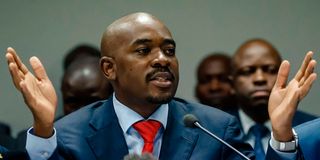Zimbabwe opposition withdraws from parliament over MPs expulsion

Nelson Chamisa of the opposition Citizens Coalition for Change.
What you need to know:
- Parliament led by the speaker from the ruling Zanu-PF party Jacob Mudenda went on to ban CCC legislators from attending six sittings.
- The ruling party failed to get a two-thirds majority in the controversial August elections, which it needs to amend the constitution.
Zimbabwe’s long running political squabbles have escalated after the opposition announced a temporary pullout from Parliament in protest against the recalling of 15 of its legislators by an alleged imposter.
The controversial recall of the Citizens Coalition for Change (CCC) legislators by a self-styled secretary of the party Sengezo Tshabangu triggered commotion on Tuesday as opposition legislators were violently ejected from Parliament by riot police for refusing to leave the Assembly.
Parliament led by the speaker from the ruling Zanu-PF party Jacob Mudenda went on to ban CCC legislators from attending six sittings and docked them two months worth of salaries punishment.
Legislators from outside the capital Harare were immediately kicked out of hotels after instructions from Parliament and were left stranded.
CCC led by Nelson Chamisa, who rejected President Emmerson Mnangagwa’s August election victory as a “gigantic fraud”, said it was giving Parliament a 14 day ultimatum to reverse the recalls or face unspecified action.
“Until this issue is resolved, CCC MPs and councilors will disengage from Parliament and councils,” Mr Chamisa said.
“When we say disengage, we do not mean that they have withdrawn. We are saying no business will be transacted until remedy and justice are done through a mechanism we have agreed.”
There were similar recalls of opposition legislators and councilors between 2021 and last amid accusations that President Mnangagwa was trying to create a one party state by crippling his critics.
The ruling party failed to get a two-thirds majority in the controversial August elections, which it needs to amend the constitution.
CCC says the 81 year ruler, who is serving his second and last term after toppling the late Robert Mugabe in a coup six years ago, is fanning divisions in its backyard to give him the leeway to change the constitution so that he can run for a second term.
A local think tank, the Zimbabwe Democracy Institute (ZDI), said the opposition recalls were part of a wider scheme to entrench President Mnangagwa’s government.
“The recent recalls of opposition MPs in Zimbabwe by a self-proclaimed acting secretary general of the Citizens Coalition for Change party Sengezo Tshabangu have exposed the fragility of democracy and the vulnerability of the opposition in the country,” ZDI said.
“The recalls, which have been effected by the ruling Zanu PF party’s speaker of Parliament, who is the secretary of legal affairs in its Soviet-style political bureau (politburo) intends to reduce the opposition’s representation party’s chances of achieving a two-thirds majority in Parliament.”
Zanu PF insists that it has nothing to do with the recalls, which it blames on CCC internal fights.
ZDI said the turmoil could be traced back to the 2017 coup and showed the death of democracy in the southern African country that has moved from one political crisis to another since the turn of the millennium.
“While the recalls may be misconstrued to be a macrocosm of internal opposition CCC squabbles, they feed into a broader dual securocratic state consolidation project of countering the internal and external legitimacy challenges exposed by the opposition on one hand, and on the other hand weakening the opposition’s power in Parliament to pave way for President Mnangagwa’s third term power ambitions,” the think tank added.
“If the court endorses these recalls and Zanu PF wins the by-elections, this would enable Zanu PF to amend the constitution, entrench its power without any checks and balances and ultimately give President Mnangagwa a third term.
“This appears to be the broader political strategy by President Mnangagwa’s Zanu PF faction.”
Philan Zamchiya, a Zimbabwean academic, said it was difficult to predict how President Mnangagwa will react to the opposition’s withdrawal from Parliament.
“The logic is that a strong regime is more likely to ignore the withdrawal,” Dr Zamchiya said.
“On the other hand, a weak regime is likely to buckle under pressure and consider some reforms when faced with a boycott. If there is low regime vulnerability, a strategic temporary retreat for opposition preservation cannot be entirely off the table.”
The recall of opposition legislators is also seen as attempts to punish CCC for demanding fresh elections after the disputed August polls that were described by observer missions as not meeting regional and international standards.
In the 2018 elections, President Mnangagwa was also accused of rigging the polls where he narrowly beat Mr Chamisa,a 45 year-old lawyer and pastor.





